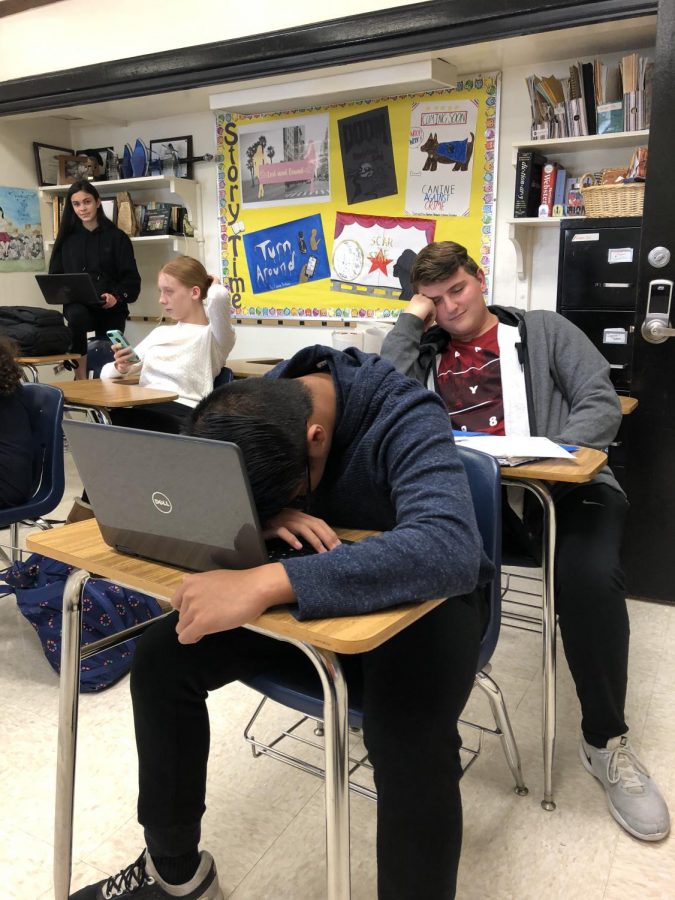Do High School Students Need More Sleep?
Sophomores Carl Zou (front) and Jason Huffine (back) “falling asleep” in class
There is continuous debate over whether schools should start later or remain at their current start time. Many students, teachers, parents, and doctors alike feel that high school students do not receive an adequate amount of sleep each night. According to the medical magazine Infectious Diseases in Children, Dr. Nathaniel Watson, professor of neurology and co-director of the University of Washington Med-School Sleep Center, stated, “Teenagers have a phase delay in their circadian rhythm that makes it very difficult for them to fall asleep before 11.” Therefore, when schools start before 8:30 a.m., students get less than the recommended eight to nine hours of sleep each night, which, according to the Nationwide Children’s website (nationwidechildrens.org), is the needed amount. Now, it is up to California State Governor Jerry Brown to sign a bill which will prohibit schools from commencing prior to 8:30 a.m in that state.
There are many consequences to not receiving adequate sleep. It can have a negative effect on one’s health, focus, memory, and ability to learn. This can be a major issue for high school students who are striving to do well in school. Lack of sleep makes it much more difficult to pay attention in class and, therefore, will have a poor impact on a student’s grades.
Many students stay after school for sports, clubs, and other hobbies. According to an Education Week article (blogs.edweek.org) entitled, “High Schools Assign 3.5 Hours of Homework a Night, Survey Estimates,” students are given a massive workload outside the classroom, making it difficult to get to bed at a reasonable time. Additionally, students are required to wake up early to get to school before 8:00 a.m., which, according to the American Academy of Pediatrics, is the appropriate wake time for teenagers. Freshman Mia Tetelman, a active member of the LHS community, who is on the girls’ varsity tennis team, takes all honors classes, and plays for the school orchestra, stated, “I try to get six or seven hours of sleep each night.” This reflects how the majority of students go about their sleep schedule. Most get significantly less than the recommended amount of sleep.
A New York Times article (nytimes.com) entitled “California Teenagers Could Sleep Later Under School Start Bill,” states, “Research has conclusively shown that teenagers who get less than eight hours of sleep are more likely to be depressed, use illegal substances, and get into car crashes.” It is no wonder teenagers are often viewed as moody! Studies prove that forcing students to get out of bed so early is the biological equivalent of an adult waking up at 3:30 in the morning.
However, many argue against Governor Jerry Brown signing the bill in California because of the effect it will have on students’ and parents’ schedules in the afternoon. Starting school later will inevitably let kids out of school later thus, delaying every other aspect of the day. This inconvenience makes many worry about how this will affect their carpools and even what time students will get to sleep. Biology Teacher Jeanette Meszaros feels that her students are more attentive in the morning classes. If school happened to start later, how would that affect students’ focus as the classes in the afternoon ended later? Would it be more difficult to pay attention if class took place at 4:00 p.m. rather than 2:00 p.m. or 3:00 p.m.?
Board Certified Pediatrician Dr. Andria Chizner stated, “Not getting enough sleep each night is associated with a higher risk of obesity, depression, high blood pressure, and increased risk of injury. However, the right amount of sleep has been shown to improve memory, attention, learning skill, and overall quality of life.”
It certainly seems that the benefits of a full night’s sleep outweigh the cons of a later school start time. If Governor Jerry Brown signs the bill to prohibit schools to start before 8:30 a.m., it will improve students’ attention and outlook at school. Maybe other states would then be inclined to follow California’s lead.

I am the editor-in-chief of the Horizon newspaper and a member of the Class of 2022. I am also the captain of the LHS Speech, Debate, and Model Congress...


















